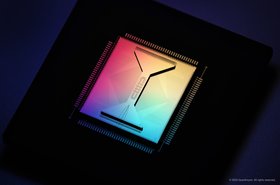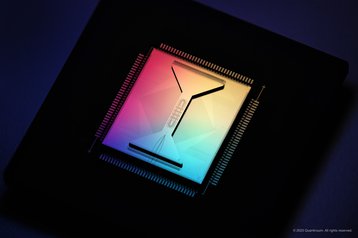Quantum computing company Quantinuum has launched a new 56-qubit quantum computer.
The company this week announced the launch of the H2-1, a quantum computer with 56 trapped-ion qubits.
Not an entirely new system, the announcement marks the upgrade of the company’s flagship System Model H2 quantum computer from 32 to 56 qubits.
“We’re extending our lead in the race towards fault-tolerant quantum computing, accelerating research for customers like JPMorgan Chase in ways that aren’t possible with any other technology,” said Rajeeb Hazra, CEO of Quantinuum. “Our focus on quality of qubits versus quantity of qubits is changing what’s possible, and bringing us closer to the long-awaited commercialization of quantum’s applications across industries like finance, logistics, transportation, and chemistry.”
Quantinuum was founded in 2021 when Honeywell spun out its Quantum Solutions division and merged it with UK quantum computing startup Cambridge Quantum Computing. Microsoft has been partnering with Quantinuum since 2019.
Quantinuum announced the launch of its first H2 system with 32 qubits in May 2023, The system occupies around 200 sq ft (18.6 sqm) in a data center in Denver, Colorado. It is reportedly one of two prototype machines in the facility.
“Microsoft looks forward to a continued collaboration with Quantinuum as they release their high fidelity 56-qubit machine,” said Dennis Tom, general manager, Microsoft Azure Quantum. “Recently, the teams created four highly reliable logical qubits by applying Azure Quantum's qubit-virtualization system to Quantinuum's 32-qubit machine. With the additional physical qubits available on Quantinuum's new machine, we anticipate creating more logical qubits with even lower error rates. As we reach these milestones, we will continue to increase the resiliency of quantum operations as well as the utility of quantum computing.”
The company said that with this upgrade in qubit count, the company will no longer be offering a commercial “fully encompassing” emulator. It said a mathematically exact simulation of the H2-1 quantum processor is now impossible, as it would “take up the entire memory of the world’s best supercomputers.”
Quantinuum’s 20-qubit H1 system is currently available through Microsoft’s Azure quantum service, alongside systems from IonQ, Quantim Cicruits Inc., Rigetti, and Pasqal.
More in HPC & Quantum
-

-

-

Episode The future of AI and HPC



